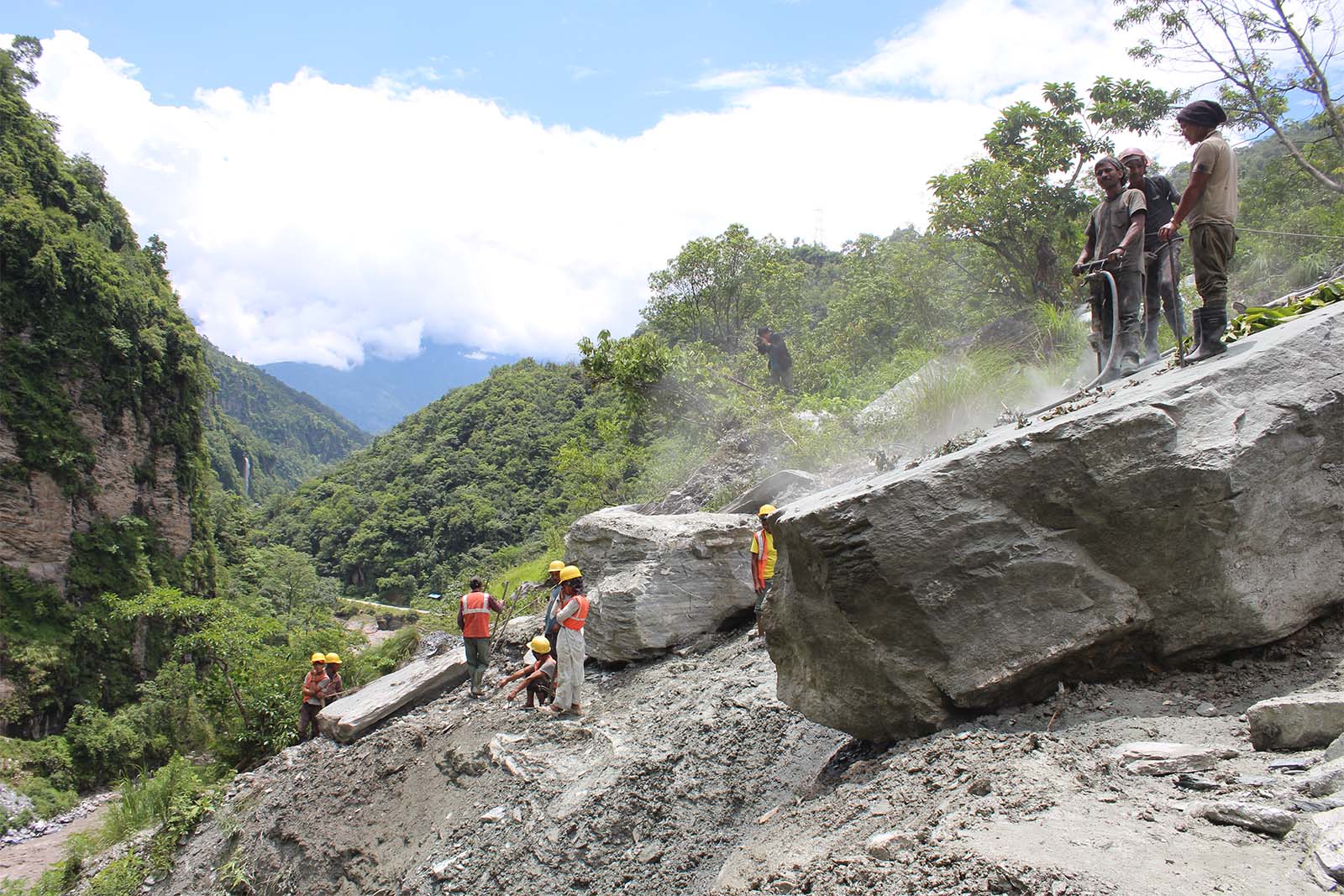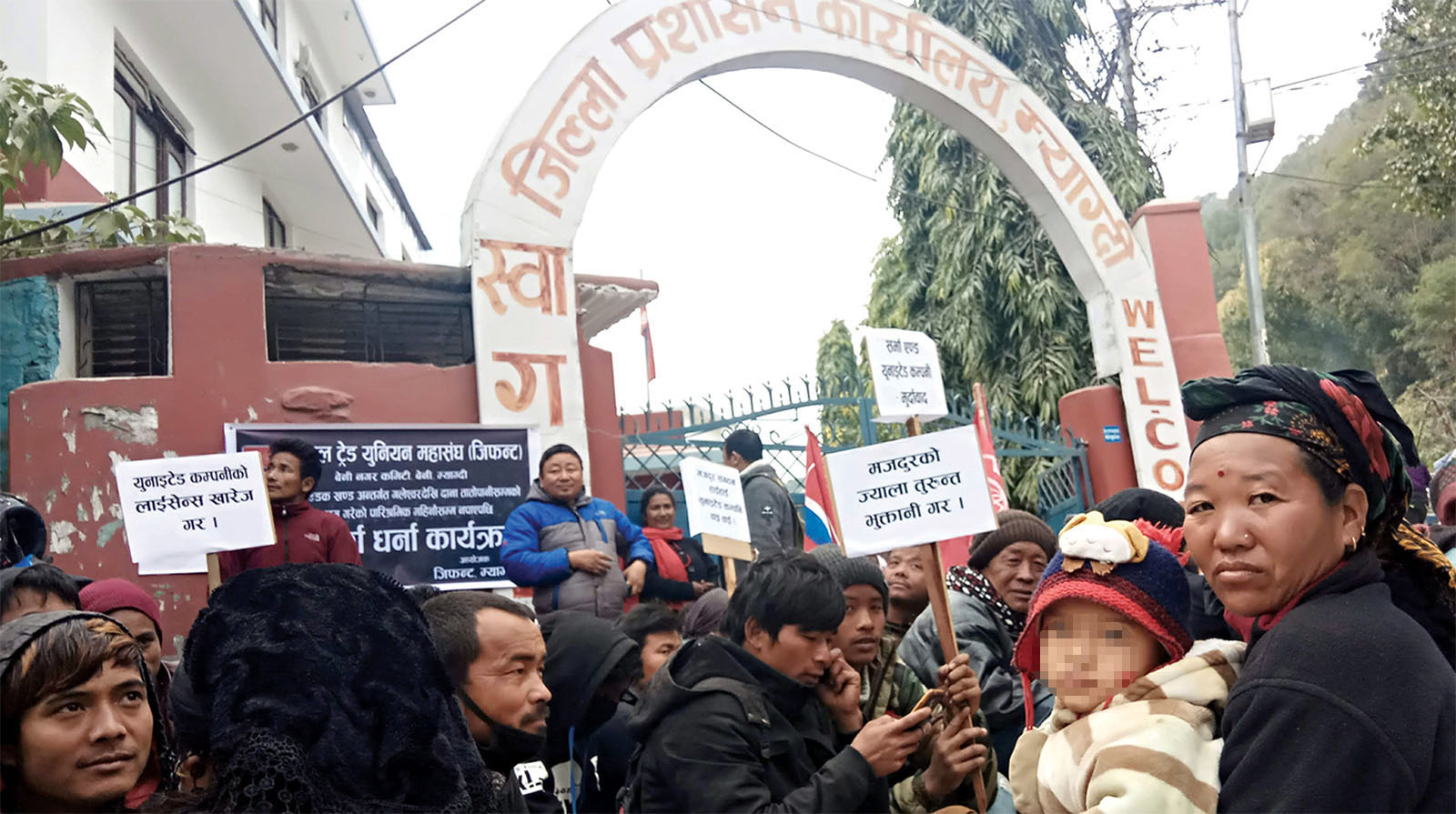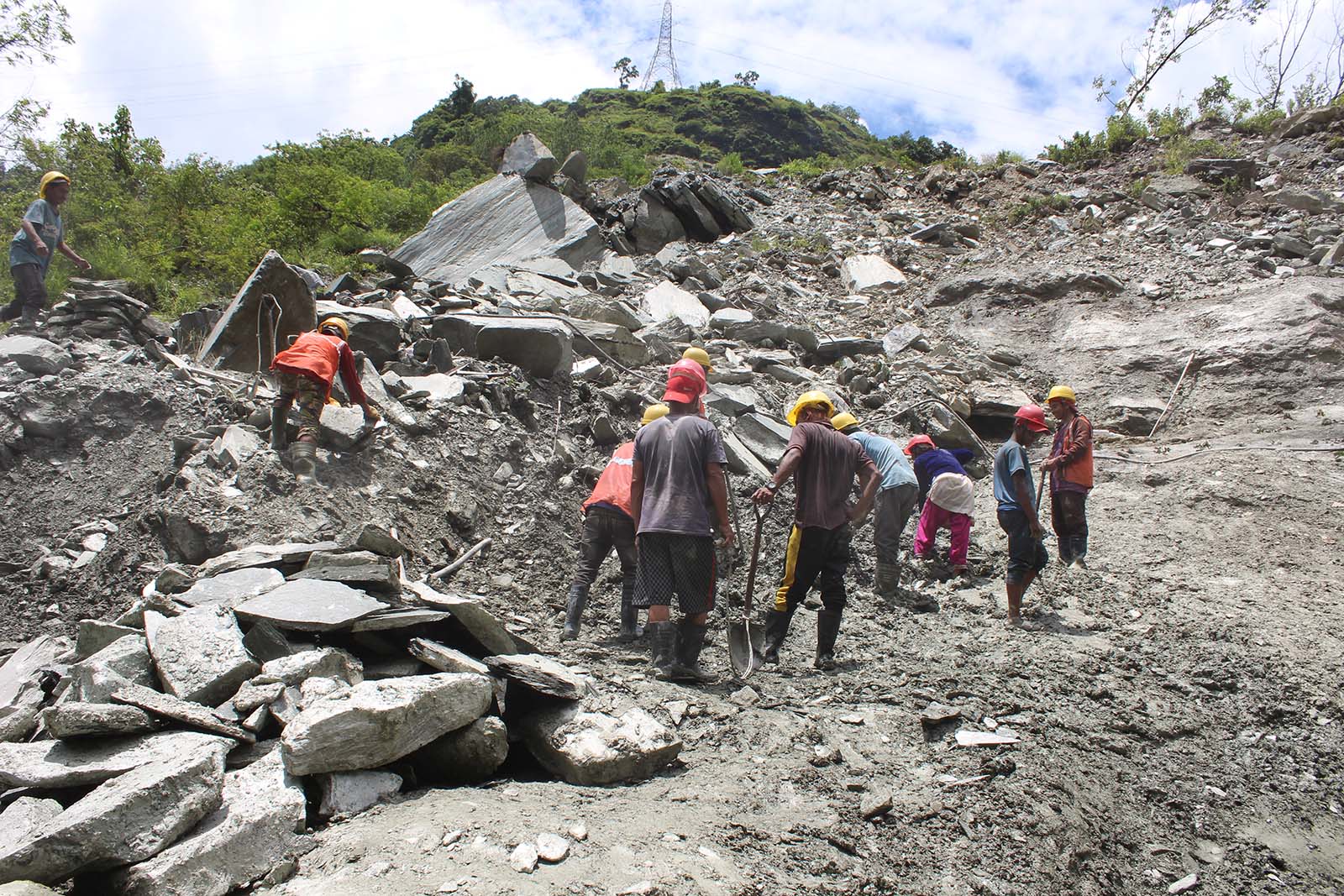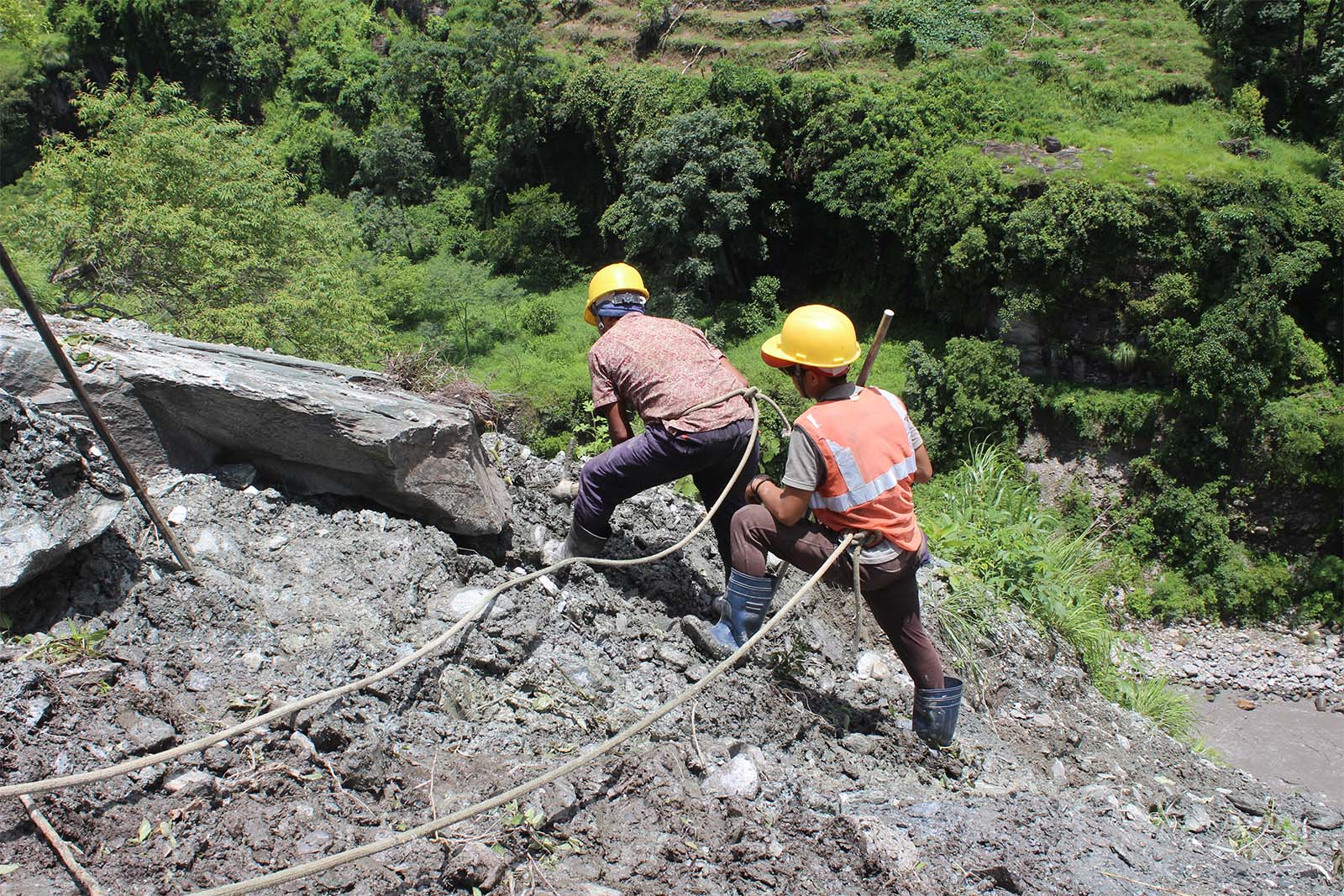Labourers who have worked on big projects in Myagdi haven’t got their wages. On the face of this exploitation, public authorities, people’s representatives and political parties have maintained a studious silence.
Ghanashyam Khadka | CIJ Nepal
It’s been over a year since the 35 labourers who were engaged in constructing Beni Hospital building returned empty-handed, without receiving the wage promised to them. Eighteen other labourers engaged in the Darbang-Bim Rural Road project were also forced to work for free. Construction companies in Myagdi have accrued profit from projects like this. The government has achieved its ‘developmental goal’. But the labourers who built the projects haven’t received their wage.
“What kind of development is this, achieved without paying the poorest?” Santabir Lama, who was engaged in building Beni Hospital, says.
According to the workers, the joint venture of Khimti, Galwa and Raffina construction companies, which was contracted to build Beni Hospital, didn’t pay them the Rs. 175,000 due wage, so they filed a complaint at the District Administration Office in Bhadra last year.

The office then corresponded with the Saghan Urban and Building Construction Project including the labourer’s memo to ‘make the necessary arrangement’ on Bhadra 26. The project then wrote a letter to the contractor on Asoj 1, 2080 BS. Ten days later, the construction entrepreneur Rabin Joshi and a labour supplier paid Rs. 10,000 to Santabir Lama, on whose name the complaint was filed, through a representative Durga Karki. The other labourers were forced to leave empty-handed. Santabir, however, threatened them that he’d kill himself and was paid Rs. 10,000 as bus fare.
The festival Dashain was near and the unpaid labourers left for their homes empty-handed.
“We had started working here since Asar 7, and I have to receive Rs. 35,000 due wage,” Santabir, who hails from Timal in Kavre, had said in Asoj last year. “Everyone has returned home, and since I don’t have enough money to return home, I am still here.”
Ashok Kunwar, site engineer with the construction company, said that they don’t have a record of the number of labourers employed at the project. “I had heard there was a dispute between the contractor, labour supplier and labourers,” Kunwar said. “But it’s been six months since I arrived here and there’s been no problem since then.”
According to the contract deal with the then Urban Development and Building Construction Department Division Office Baglung on 21 Paush, 2073 BS, the construction of Beni Hospital should have been completed in three years. But so far, only 80 percent of physical construction is completed and there’s been 73 percent of financial progress.
The Mahadev Khimti/ Galwa/ Raffina joint venture had agreed to a contract of Rs. 189 million for the building construction. Mahadev Khimti is owned by the President of Federation of Contractors’ Association of Nepal Rabi Singh; Galwa by the federation’s Deputy General Secretary Narahari Thapaliya; and Raffina by Rabin Joshi. According to engineer Shankarraj Koirala of Saghan Urban and Building Construction Project, which is tasked with monitoring the project, the construction deadline has now been extended to upcoming Chaitra.
Meanwhile, after they were denied of the Rs 917,000 wage, as many as 18 labourers, including Mangale Nagarkoti, who were employed at Darbang-Khara-Bim road upgrade project, which was contracted by Myagdi’s Malika Rural Municipality, filed a complaint at District Administration Office on 19 Asoj 2080 BS.
The district administration office asked the rural municipality not to disburse funds to the contractor AP Bulldocks Construction Pvt Ltd until it clears the due wages. The contract was first signed by the Divyajyoti Nana/ Bulldocks Construction JV and then it was handed over to Bulldocks Construction.

Meanwhile, Bulldocks’s proprieter Bipin Khadka went out of contact without completing the work. Amid this, the main contract company Divyajyoti Nana appointed another entrepreneur Narayan GC as the official representative and completed the remaining work. The rural municipality didn’t stop the payment due to the contractor either. Then, on 21 Asoj 2080 BS, the rural municipality sent a letter to the contractor asking it to pay the wages due to labourers and carbon-copied to the district administration. The letter remained just a formality. Now the project’s finances are all settled but the labourers remain unpaid.
“After the labour suppliers left the project midway, many labourers had complained to us about unpaid wages,” said Begprasad Gurbaja, chair of Malika Rural Municipality. “We wrote them a letter and warned them. Then a new set of labour suppliers came but the labourers didn’t come to us. We thought they were now paid so made the payment to the contractor.”
Deepak Sapkota, an engineer with Malika Rural Municipality who is tasked with monitoring the Darbang-Khara-Bim road, claimed that since the deal paper doesn’t mention details about the number of labourers and their wage and the contract is signed by the main contractor, the local unit can’t halt the payment process.
But whatever may the government officials or the construction company say, the Article 66 of Labour Act says that the main contractor is responsible for paying the labourers in any case, even though the labour supplier hires them.
But the contractors and regulators are ignoring this clause. And as a result, labourers employed in many construction projects across the country are vulnerable to being forced to unpaid labour.
The only agency that listens to the grievances of labourers in Gandaki Province is the Labour Office Pokhara, according to Suresh Dhakal, the office’s chief. “We have received complaints from labourers employed in hotels, factories and some other informal sectors,” he said. “But labourers in the construction sector and those in remote areas don’t have access to us.”
Lack of record
In the fiscal year 2080-81 BS alone, as many as 12 complaints about wage nonpayment in various government projects have been filed at the District Administration Office Myagdi. Of them, six complaints involve the nonpayment of wage amounting to Rs. 1 million 949 thousand due to 50 labourers. Four involve nonpayment of cost incurred while purchasing rations due to various shops and the rest of the two involve nonpayment of transportation and rental fares.
“We found out that during the coronavirus pandemic, after the contractors went out of contact, hundreds of labourers were left starving but the situation has improved now,” Dhirendraraj Panta, Information Officer and Assistant Chief District officer, said. “There’s a chain of command in the payment process in contract works and when one messes things up, the labourers at the lower level bear the brunt.”
Panta said that though they received complaints from labourers in earlier years, they have not kept a record of that. “We have started keeping a record of complaints in writing since fiscal year 2080/81 BS,” he said.
But the district administration office hasn’t been able to make the contractor pay the wages to labourers employed at Beni Hospital construction. Most of the complaints that the office has received have been sent to the police with the note ‘to make necessary facilitation’.
(See the name of companies not paying labourers.)
Meanwhile, the number of complaints from labourers over unpaid wages is even higher in the Myagdi District Police Office. Of the 18 complaints lodged over non-payment in fiscal year 2080-81 BS, 14 are related to unpaid wage to labourers amounting to Rs 7 million 147 thousand.
“We have summoned some contractors and asked them to make the payment,” Rajan Rayamajhi, Information Officer at the District Police Office, said. “Others have promised to pay the dues. And since the labourers haven’t returned back to us, we assumed that they were paid by now. Majority of the complaints are from local labourers. We haven’t received complaints from labourers who have come from afar.”
(See the details of complaints filed at the District Police Office.)
That the district police and administration have records of complaints within only a year and they include those received from only the local labourers suggests that the number of swindled labourers is much higher.
‘A crime against humanity’
In 2076 BS, as many as 95 labourers from Rukum, Rolpa, Salyan, Jajarkot and Bajhang who were employed in various sections of the Beni-Jomsom-Korala road construction project staged demonstrations multiple times demanding the Rs. 1.2 million that they had to receive. Only after the then Chief District Officer Gyannath Dhakal warned the construction company Sharma/United that he would punish the owners that the labourers received half of the amount that they were owed and called off their protests.
It was untenable for the labourers from remote areas to return to Myagdi again for the remaining amount and they didn’t. The district administration didn’t care either.
Baldevi Baruwal Rai, former chair of General Federation of Nepalese Trade Unions (GEFONT), contractors usually bring labourers from remote areas and pay them meagerly, if at all. “This is not just labour exploitation. This is a crime against humanity,” she says. “The silence of the authorities concerned, people’s representatives and political parties on the face of this grave injustice is despicable.”

According to the site engineer Kunwar employed at Beni Hospital construction, while the main contractors take responsibility for big projects, they divide the work into various parts, including ‘civil work’, ‘tile marble’, electric and plumbing, and get the work done through several other small sub-contractors. In ‘civil works’ like wall construction, unskilled labourers are used. And the labour suppliers take the responsibility of supplying these labourers.
“The construction work is divided into several parts and the work is done through sub-contractors. Unless in cases of extraordinary circumstances, the main contractors make the full payment to subcontractors,” says Narayan GC, former chief of Construction Businessmen’s Association, Myagdi. “It’s the subcontractors and labour suppliers who swindle the labourers.”
According to Tribikram Subedi, Finance Officer at Infrastructure Office Myagdi, the firm bidding the lowest cost is usually allowed the tender. And when firms compete to bid the lowest, it hampers the quality of construction and labourers’ wages, Subedi says.
“When they find out the amount they had bid for the project is insufficient, they don’t pay the cost of construction material and labour wage,” Subedi says. “In such situations, we mediate between the contractors, labourers and suppliers.”
According to Subedi, contractors who flee by leaving the way midway tend to extend the deadline misusing a provision in Public Procurement Act after some time. By that time, the previous labourers are already gone and they have no hope of getting their wages. And the authorities also find it easy to get the work done through old contractors. The issue of labourers’ wages does not figure in this process.
Legal shortcomings and lack of implementation
Myagdi’s Chief District Officer Lakshman Dhakal, who was recently transferred to the Ministry of Federal Affairs and General Administration, none of the existing laws, including Procurement Act and Labour Act, have designated responsibility for the district administration office or the police to oversee matters related to the labourers’ wages. “All we can do is mediate,” Dhakal said. “Because the laws are more for formality and less for implementation, workers in construction and informal sectors are being unfairly treated.”
The Public Procurement Act 2063 and Working Procedure 2064 mandate the authority concerned to make payment to the main contractor at their authorised bank account. None of these two laws mentions labourers and workers.

The Local Government Operation Act 2074’s Part 8 Clause 47 (1) D provides the responsibility of overseeing wage nonpayment to the judicial council formed at the local unit.
Meanwhile, the Labour Act 2074 has mentioned that the labour supplier should take permission from authorities and they can’t employ workers without a job deal, and that the main contractor is liable to pay the workers if the supplier doesn’t do so. “But the authorities responsible for implementing the law are ignoring the provisions, so workers are facing injustice,” said Govinda Upadhyay, Myagdi’s district attorney.
Why don’t the labourers get wages?
The construction companies and labour suppliers appear to be main culprits in wage non-payment. It is apparent around the country that the contractors receive the amount from authorities and invest it somewhere else, rather than paying the workers. Moreover, as the contractors compete to lower the bidding price, it is workers who finally bear the brunt.
As workers coming from remote areas can’t afford to fight for unpaid wages for long, they leave for new jobs and give up on hope of getting their wages. Meanwhile, another reason is the subcontractors and labour suppliers also invest the amount they receive from contractors somewhere else and when the time comes to pay the workers they don’t have the money.
Other reasons include disputes between partnering companies and lack of quality work. But whatever may be the reason, in the end it is the contractor’s responsibility to pay the workers no matter what.
Upadhyay, the district attorney, says that existing laws including Labour Act 2074 have enough provisions mentioning that the contractors are liable to pay the workers no matter what. In many cases, the contractors and authorities concerned collude in not paying workers, Upadhyay says.
Meanwhile, the Public Procurement Act and Working Procedure do not have a provision mandating the contractor to submit the estimated wages of workers.
“To solve the recurring issue of wage nonpayment, it is essential to prepare a new contract format between construction companies and labourers that guarantees the minimum wage,” says Bishnu Paudel, chief engineer of Infrastructure Office, Myagdi.
Moreover, district attorney Upadhyay says that to ensure worker rights, the contract process should compulsorily incorporate labour deal, to form a unit to monitor the implementation of Labour Act at District Coordination Committee that also listens to grievances about wage non-payment, and introduce a provision for the district court to hear cases related to labour.
Suresh Dhakal, the chief of Labour and Employment Office Pokhara, however, says that to ensure the rights of workers employed at construction and other informal sectors, it is essential to amend the Labour Act.



